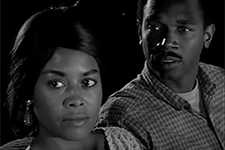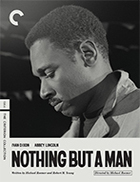Nothing But a Man
|  Produced on a shoestring budget and barely released after its completion in 1964, Nothing But a Man wasn’t fully recognized until nearly three decades later, when it was restored and re-released in 1993, prompting critics to take a new look and leading to its being included in the National Film Registry in 1994. A probing, sensitive, thoughtful depiction of the difficulties of Black life in the South during the Civil Rights era, when progress was being made, but entrenched racism still dictated the realities of far too many people’s lives, Nothing But a Man is masterful in its subtle drama and commitment to a neorealist-style depiction of lived reality. Italian neorealism had already had a profound impact on international cinema by the early 1960s, influencing filmmakers around the world, including members of the French New Wave and British New Wave, Satyajit Ray in India, Ousmane Sembène in Africa, and John Cassavetes in the U.S. Nothing But a Man should be rightly recognized within that contingent of filmmakers whose striking and personal works cut against the gloss and polish and superficiality of so many mainstream films. Written by Michael Roemer (who also directed) and Robert M. Young (who co-produced and shot the film), two liberal Jews who met while students at Harvard in the 1950s and subsequently built a cinematic partnership that lasted for decades, Nothing But a Man is one of a number of small-scale art films released in the early 1960s that took a fresh approach to depicting Black life in America, a subject that had been previously relegated to so-called “race films” and had only tentatively been taken up by a handful of Hollywood filmmakers. As Donald Bogle noted in his seminal study Toms, Coons, Mulattoes, Mammies, & Bucks: An Interpretive History of Blacks in American Films, such films offered “grimly realistic and cynical looks at black America.” They included Cassavetes’s Shadows (1960), Shirley Clarke’s The Cool World (1963), and Larry Peerce’s One Potato, Two Potato (1964), as well as Nothing But a Man, which Bogle describes as a film that is “quiet in tone, notable for its subtlety” in telling “its deep, dark tale simply.” Set in the Deep South (although it was shot primarily in New Jersey), the story follows the experiences of a young Black man named Duff Anderson (Ivan Dixon). When we first meet Duff, he is an itinerate railroad worker, a life that is irrevocably changed when he meets Josie Dawson (Abbey Lincoln), a schoolteacher and daughter of a local minister (Stanley Green). Her father is none too pleased that his daughter is interested in a man like Duff, who has no formal education, professes no religious convictions, and whose unmoored existence seems counter in every way to stability and family. Nevertheless, Duff and Josie fall in love and get married, which necessitates Duff finding regular employment. Duff’s own background is complicated by the fact that he has a young son out of wedlock who is being looked after by another woman and that his father (Julius Harris) is an embittered alcoholic living with a long-suffering girlfriend (Gloria Foster). Maintaining a steady job turns out to be a difficult endeavor, especially when Duff is associated with unionization at a sawmill and is subsequently blacklisted. Indignities are heaped upon him from privileged Whites—not just the leering racists who openly taunt him and Josie, but also the foremen, shop keepers, and business owners who think nothing of referring to him as “boy.” He also strains under the weight of men like Josie’s father, whose desire to integrate into White society has permanently compromised them (in one of the film’s sharpest moments, Duff tells his father-in-law “You been stoopin’ so long, Reverend, you don’t even know how to stand straight no more”). Duff sees over and over and over again how the system is stacked against young Black men like himself, who are trying to do everything “right” to achieve the American dream—work for a living, get married, start a family—but are constantly stymied, marginalized, or outright rejected. In this respect, one of the crucial choices Roemer and Young made early on was to not make the film overtly political. That is, there are no grand speeches about racism and inequality; there is little mention of current events, including the Civil Rights Movement or its central figures; and, while an important plot point involves unionization and the price that Duff pays for being associated with it, the political word exists only insofar as it affects the day-to-day lives of the characters. Rather than a polemic, Roemer and Young wanted to make a study of Black life, a natural extension of Roemer’s dramatic instincts and Young’s experience in documentary filmmaking (one of his early television projects was Sit-In, a short documentary about student desegregation attempts in Nashville). Thus, the racism that Duff must constantly endure is all the more dramatically powerful and emotionally unsettling because it isn’t turned into an opportunity for overt grandstanding; rather, it is simply presented as a cruel, unsettling reality that is sometimes overt, but all too often seamlessly threaded into everyday events and interactions, reminding men like Duff of where they stand in the economic and social systems from which they cannot escape. And, of course, it is the albatross that Duff must constantly manage, as he weighs his responses to racist rhetoric both subtle and overt in a way that allows him to maintain his own personal dignity, but without putting himself or his family in abject danger of physical violence—a balance he doesn’t always strike (who could?). It helps immensely that the film is anchored by such powerful performances by Ivan Dixon, who at the time had only had supporting roles in films, mostly notably in A Raisin in the Sun (1961), and Abbey Lincoln, a jazz vocalist making her acting debut. Dixon’s performance is nuanced and complex, as we must often read his emotions and thoughts off a face that he must deliberately keep in check. This is particularly true in a scene near the end when he is working as a gas station attendant and is being harassed by a car full of white man, including one he insulted while towing his car out of a ditch. The danger is palpable, and we instinctively want Duff to just let it go to keep him out of danger while at the same time recognizing that such behavior is what keeps the unjust system working and denies him his humanity. Similarly, when the frustrations become too much and he takes his accumulated anger out on Josie both verbally and physically, it is a literal shock, a moment that draws an audible gasp because it takes all the air out of our hopes in one sudden rush. Lincoln’s portrayal of Josie at this moment is heartbreaking because she bears the same deflation, that same sudden and irrevocable loss of belief that things can get better. And, while this makes it sound like Nothing But a Man is a depressing descent into unresolvable social and personal strife, it is quite the opposite. While Roemer and Young have no illusions about the depths of racism in America in the early 1960s, they still leave room at the end for at least the possibility of a better world. They don’t sugarcoat or dismiss or pretend that the realities of the world aren’t still what they are (Roemer, after all, fled Germany when he was 11 to avoid the Holocaust, and both he and Young experienced real threats to their lives when they travelled in the South researching for the film). Yet, that doesn’t mean that all hope is lost, even if it sometimes feels that way. As Duff says, “It ain’t gonna be easy, baby—but it’ll be alright.”
Copyright © 2024 James Kendrick Thoughts? E-mail James Kendrick All images copyright © The Criterion Collection | |||||||||||||||||||||||||||||
Overall Rating: 


 (4)
(4)


